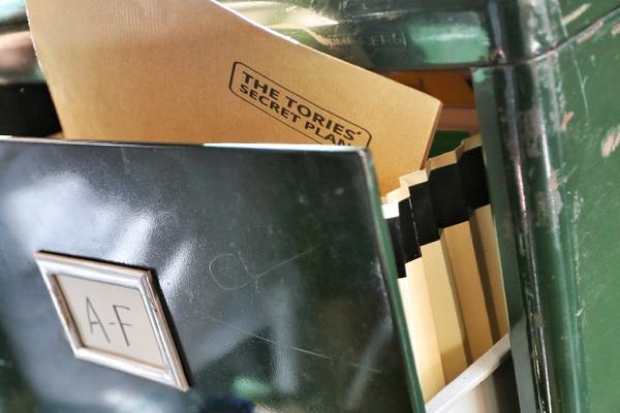A common technique in gothic horror novels is to avoid describing whatever monster the author is trying to scare readers with. The imagination is even more powerful than the pen, and silence on the details of the beast means those reading will concoct their own personal nightmare as they read on. This was always the risk with the Tory refusal to set out the detail of the £12 billion of welfare cuts they plan to make in the next Parliament.
Ed Miliband is trying to exploit that lack of detail today by launching a ‘dossier’ that sets out the ‘secret plan’ the Tories have on welfare cuts. In his speech this morning, the Labour leader said:
‘Today we show what another five years of Tory government would mean. A Tory secret plan. A plan that puts the prosperity of your family at risk. Cuts to tax credits. Cuts to child benefit. A threat to your family finances. 7 and a half million families losing an average of £760 a year. Working families can’t afford another five years of this Tory government.
‘And if the Tories deny it, ask yourself why yet again today they haven’t ruled out making changes to tax credits or child benefit? Today their desperate last minute gimmick merely highlights what they have left out: no protection for family benefits.’
Labour has also put an ad on Mumsnet, just to hit the voters it thinks will be particularly unsettled by this.
Look what’s hidden in the Tory filing cabinet: http://t.co/5juef7YkCe pic.twitter.com/d5VOOvHaxQ
— Labour Press Team (@labourpress) April 29, 2015
Leaving out the detail allows Labour to say the Tories can ’only’ be planning to cut child tax credits and child benefits. The Tory secret plan, according to Labour, is to ‘cut £3.8 billion from the tax credits working families rely on’, ‘include child benefit in universal credit, meaning a cut of more than £1,100 a year for 4.3 million families’ and ‘double the pace of cuts next year’.
The Institute for Fiscal Studies, which has been particularly unimpressed with the way the Tories have failed to spell out the detail on welfare cuts, yesterday suggested some examples of how the party could cut the bill. These were:
- Abolishing child benefit and compensating low-income families through universal credit would reduce spending by around £5 billion;
- Reducing the child element of universal credit by 30% to reach its 2003–04 level in real terms would also cut spending by around £5 billion;
- Taxing DLA, PIP and attendance allowance would raise around £1½ billion;
- Making all housing benefit recipients pay at least 10% of their rent would cut spending by around £2½ billion.
The IFS pointed out that there were other ways of doing it too. It also, rather inconveniently for Labour, said that families would be worse off under every party in the next Parliament. The report said:
‘With significant deficit reduction still to come, households can expect the tax and benefit changes implemented over the next parliament to reduce their incomes, on average.
‘There are large differences between the Conservatives, Labour Party and Liberal Democrats in how they propose to do this. But they share a lack of willingness to be clear about the details, and an inability to resist the urge for piecemeal changes which make the overall system less efficient and coherent.’
Oddly enough, Miliband didn’t mention that in his speech.







Comments